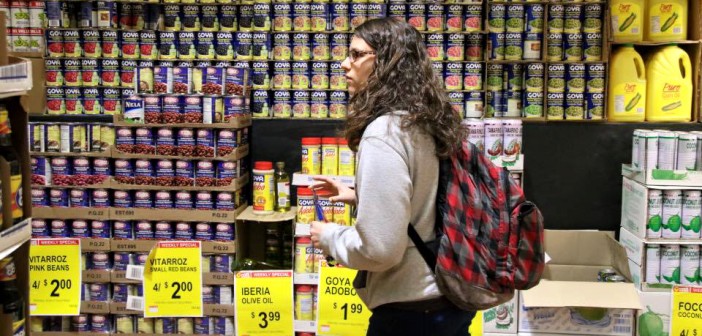South Bethlehem is considered a food desert by the U.S. Department of Agriculture, and South Bethlehem residents and Lehigh students alike are affected by of the lack of accessible food.
A food desert is defined by the U.S. Department of Agriculture based on accessibility to healthy, quality food as measured by proximity to a store or resources — such as income to vehicle availability — that affect an individual’s access to these food vendors.
Students who live off campus or in apartment-style housing without a meal plan often prepare their own meals in their homes with groceries they must purchase at an off-campus location. The lack of access to fresh produce and grocery stores in the area inhibits students’ ability to do so.
“I honestly don’t even go grocery shopping, probably because good ones aren’t close,” Dana Heller, ’16, said. “I did a meal plan because I didn’t want to go shopping. Another girl I live with basically has to wait until anyone else goes shopping because none of the good grocery stores are in walking distance. Basically, if you don’t have a car, you need a friend that has a car.”
South Bethlehem has two grocery stores within short walking distance of Lehigh’s campus — Ahart’s Market and C-Town Supermarket.
Even though there are grocery stores in the area, their products and quality may not include fresh produce and other fresh groceries, and the selection may be limited.
“I’ve been to C-Town and it’s not that nice,” Julia Serrao, ’19, said. “They don’t have a big selection, and they are lacking in quality I would say.”
Serrao said if there were better quality grocery stores within walking distance, she would take advantage of the opportunity to purchase groceries regularly.
According to Goldenberg Development, a Whole Foods Market is planned for the shopping plaza in Lower Macungie Township. This store, however, is a 25-minute drive from Lehigh’s campus. Another grocery store, Wegmans, is a 15-minute drive from Lehigh’s campus.
“I don’t go to the ones in South Bethlehem, unless to pick stuff up here and there, but I have to wait for a friend to go to a grocery store and then hope that they’re going at a time I can go so I can get a ride with them,” Katie Howlin, ’16, said.
She said transportation is vital to access a quality grocery store in Bethlehem.
Professor Judith Lasker led a graduate class in the department of sociology and anthropology to research food insecurity in Bethlehem. Between the survey and interviews the class conducted, they found 63.8 percent of respondents showed one sign of food insecurity, and 19 percent had high food insecurity.
The U.S. Department of Agriculture defines food insecurity as “limited or uncertain availability of nutritionally adequate and safe foods or limited or uncertain ability to acquire acceptable foods in socially acceptable ways.”
The group found the main reason people in Bethlehem did not routinely grocery shop was they had difficulty finding transportation to grocery stores.
Their research, based on several figures, illustrated that some Bethlehem households walk to Ahart’s from over a mile away to grocery shop. Those who have access to cars are significantly less food insecure than those who do not have access.
Bethlehem continues to have high food insecurity and a growing need for better quality grocery stores.






Comment policy
Comments posted to The Brown and White website are reviewed by a moderator before being approved. Incendiary speech or harassing language, including comments targeted at individuals, may be deemed unacceptable and not published. Spam and other soliciting will also be declined.
The Brown and White also reserves the right to not publish entirely anonymous comments.
3 Comments
The Bethlehem Food Co-op is working to address this. If Lehigh students are expressing a need, what would it take to perhaps get administration at a table with the Co-op to discuss a possible solution?
Buying things from a store directly affects what the store has to offer. The best option is to buy food from these stores and also have a healthy dialogue with them about what foods they offer and their quality. This “the good stores are far away” attitude further contributes to the class divide between the Lehigh students and the locals and really illustrates the wiling disconnect between the two populations. Additionally, Bethlehem offers multiple farmers markets if the issue truly is about access to high quality produce. This is coming from the experience of a Lehigh student who is a local.
Thank you Tara…I had just posted a similar comment on the Bethlehem Food Co-op’s FBook post about this article. There is a cultural disconnect in the conversation about ‘food deserts’ and whose values are used to define “quality.’